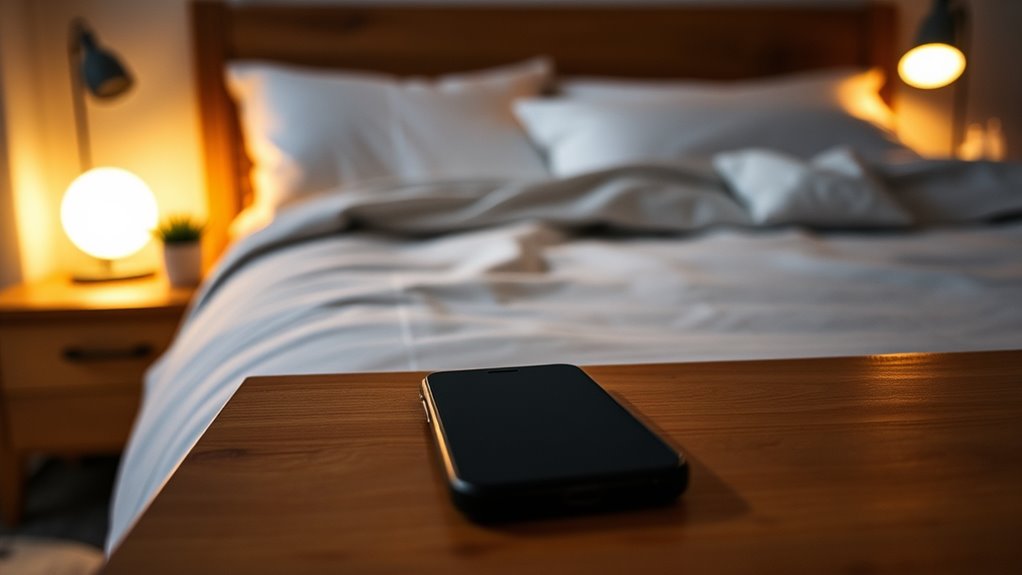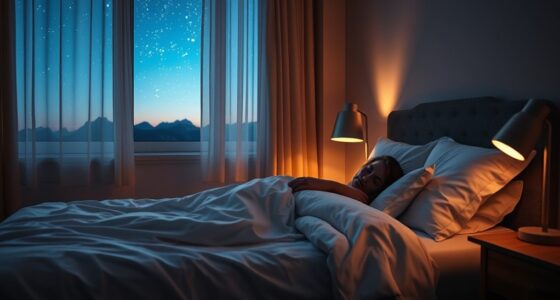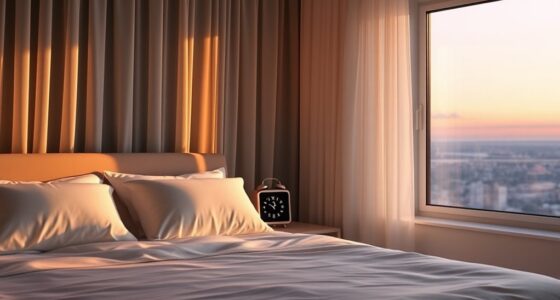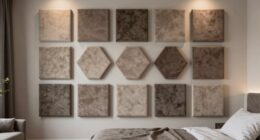To improve your sleep, try a digital detox before bed by putting away devices at least an hour beforehand. Use blue light filters or night mode on your screens if you need to use them late, or wear blue light blocking glasses. Keep devices outside your bedroom or on a charging station away from your bed. Creating these habits helps your body produce melatonin naturally and keeps your circadian rhythm on track—exploring further can help you optimize your sleep routine.
Key Takeaways
- Turn off or dim screens at least an hour before bedtime to promote melatonin production.
- Use blue light filters, night mode settings, or blue light blocking glasses during evening device use.
- Establish a digital curfew and replace screen time with relaxing activities like reading or meditation.
- Keep devices outside the bedroom or in designated charging stations to reduce late-night temptations.
- Create a tech-free environment in the bedroom to signal your body that it’s time to wind down and sleep.
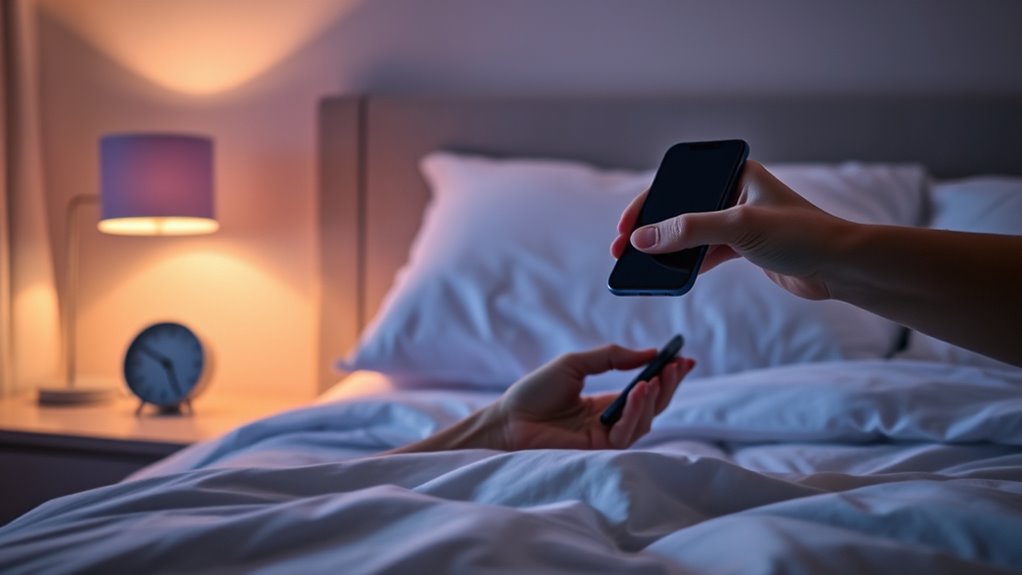
In today’s digital age, it’s easy to fall into the trap of scrolling through screens right up until bedtime. You might find yourself mindlessly scrolling through social media, catching up on emails, or binge-watching shows, all while your eyes grow tired and your mind stays overly stimulated. This constant exposure to screens, especially right before sleep, can critically disrupt your sleep quality. Many people struggle with smartphone addiction, making it particularly tempting to keep devices close at hand even late into the night. That’s why effective screen time management becomes essential—not just to reduce overall screen time but also to create a healthier pre-sleep routine.
When you don’t set boundaries around your device usage, blue light emitted from screens interferes with your body’s natural sleep signals. Blue light suppresses melatonin, the hormone responsible for signaling your body that it’s time to sleep. Without enough melatonin, falling asleep becomes harder, and your sleep cycle gets disrupted. To combat this, it’s essential to develop habits that minimize blue light exposure during the hours leading up to bedtime. Turning off or dimming screens at least an hour before bed helps your body wind down and prepares it for restful sleep.
Implementing screen time management strategies can make a noticeable difference. Consider establishing a digital curfew, where you put away your devices at a set time each night. Instead of scrolling, use that time for relaxing activities like reading a book, meditating, or practicing gentle stretches. If you rely heavily on your phone or tablet for relaxation, look into blue light filters or night mode settings that reduce blue light emissions. Wear blue light blocking glasses if you need to use screens in the evening, especially if you’re working late or catching up on social media.
Creating a tech-free zone in your bedroom sends a clear message to your brain that it’s time to wind down. Keep your devices outside the bedroom or in a designated charging station away from your bed. This helps prevent the temptation of late-night scrolling and reduces the risk of falling into smartphone addiction. Remember, managing your screen time isn’t about deprivation; it’s about being intentional with your habits so that your body can naturally produce melatonin and prepare for quality sleep. Additionally, choosing the right projector technology for your home theater setup can enhance your viewing experience without sacrificing your sleep health, since many modern projectors include blue light reduction features.
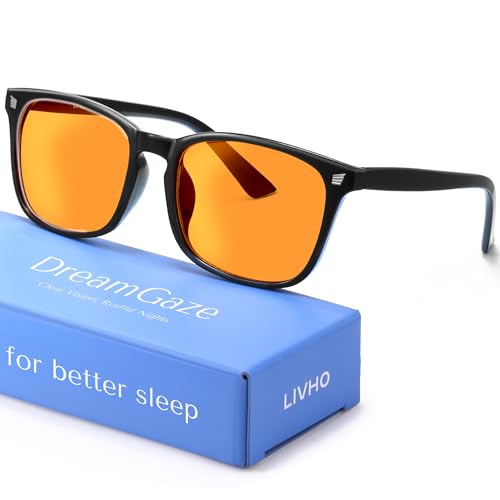
livho Gaming Blue Light Blocking Glasses for Better Sleep, Premium Night Driving, Computer Blockers for Man & Woman
REDUCE EYE STRAIN: These glasses for computer eye strain limit your blue-light exposure and alleviate eye strain, headaches,…
As an affiliate, we earn on qualifying purchases.
As an affiliate, we earn on qualifying purchases.
Frequently Asked Questions
How Long Should I Disconnect From Screens Before Sleeping?
You should disconnect from screens at least 30 to 60 minutes before sleeping. This allows you to establish screen-free routines and focus on calming pre-sleep activities like reading or meditation. Avoiding blue light during this time helps your body produce melatonin naturally, making it easier to fall asleep and improve sleep quality. Prioritize this window to create a healthy bedtime habit and make certain of restful, restorative sleep.
Are There Specific Devices That Emit Less Blue Light?
Yes, some devices emit less blue light. E-ink readers, like Kindle Paperwhite, use screen emission that mimics paper, reducing blue light exposure. Tablets with blue light filters or night mode settings also cut down on harmful emissions. Smartphones with adjustable display settings or blue light glasses can help. Choose device types designed for minimal screen emission, especially before bed, to protect your sleep quality.
Can Blue Light Glasses Improve Sleep Quality?
Blue light glasses can improve your sleep quality by blocking or filtering out blue light, which interferes with your sleep hygiene. When you wear these glasses in the evening, they help reduce blue light exposure from screens, making it easier for your body to produce melatonin. This leads to better sleep patterns, quicker sleep onset, and more restful nights, supporting overall health and well-being.
Does Screen Time Earlier in the Evening Affect Sleep?
While screen timing earlier in the evening might seem harmless, it actually impacts your sleep more than you realize. Your evening habits set the stage for restful sleep, and exposure to bright screens disrupts melatonin production. If you limit screen use before bed, you’ll find it easier to fall asleep and enjoy quality rest. Prioritize winding down without screens to create healthier sleep patterns and improve overall well-being.
Are There Any Natural Remedies to Counteract Blue Light Exposure?
Yes, you can use natural remedies like herbal sleep aids such as chamomile or valerian root to help counteract blue light exposure. Melatonin supplements are also effective, as they boost your body’s sleep hormone production. Incorporate these remedies into your bedtime routine, and avoid screens at least an hour before bed. This approach helps regulate your sleep cycle naturally, making it easier to fall asleep and enjoy restorative rest.

JESOHO Blue Light Screen Protector for iPhone 16e iPhone 13 iPhone 13 Pro & iPhone 14 (6.1inch), Eye Protection Tempered Glass Film, Scratch-Resistant, No Bubble with Easy Installation Kit, 2 Pack
Applicable model: Compatible with iPhone 16e iPhone 14 iPhone 13 and iPhone13 Pro (6.1Inch).Please check the model of…
As an affiliate, we earn on qualifying purchases.
As an affiliate, we earn on qualifying purchases.
Conclusion
By ditching your screens before bed, you might just find it easier to drift off—and suddenly, your sleep feels more restful. It’s funny how putting away devices can unexpectedly improve your mornings and overall mood. So, next time you reach for your phone, remember that a simple digital detox could be the secret to better sleep—and maybe, a little more peace of mind, just when you need it most. Sweet dreams might be closer than you think.

Night Mode Screen Dimmer
Eye protector
As an affiliate, we earn on qualifying purchases.
As an affiliate, we earn on qualifying purchases.

Sleep-A-Weigh Plus | Liquid Sleep Multimineral | Natural Sleep, Stress & Weight Loss Aid | w/Collagen, L-Carnitine, L-Lysine, Tonalin CLA, Apple Cider Vinegar, 5-HTP, Vitamins | Non-GMO | 32 Serv
✅ HELPS YOU FALL ASLEEP FASTER & RELIEVE STRESS: Sleep A Weigh Plus contains natural vitamins, herbs, and…
As an affiliate, we earn on qualifying purchases.
As an affiliate, we earn on qualifying purchases.
